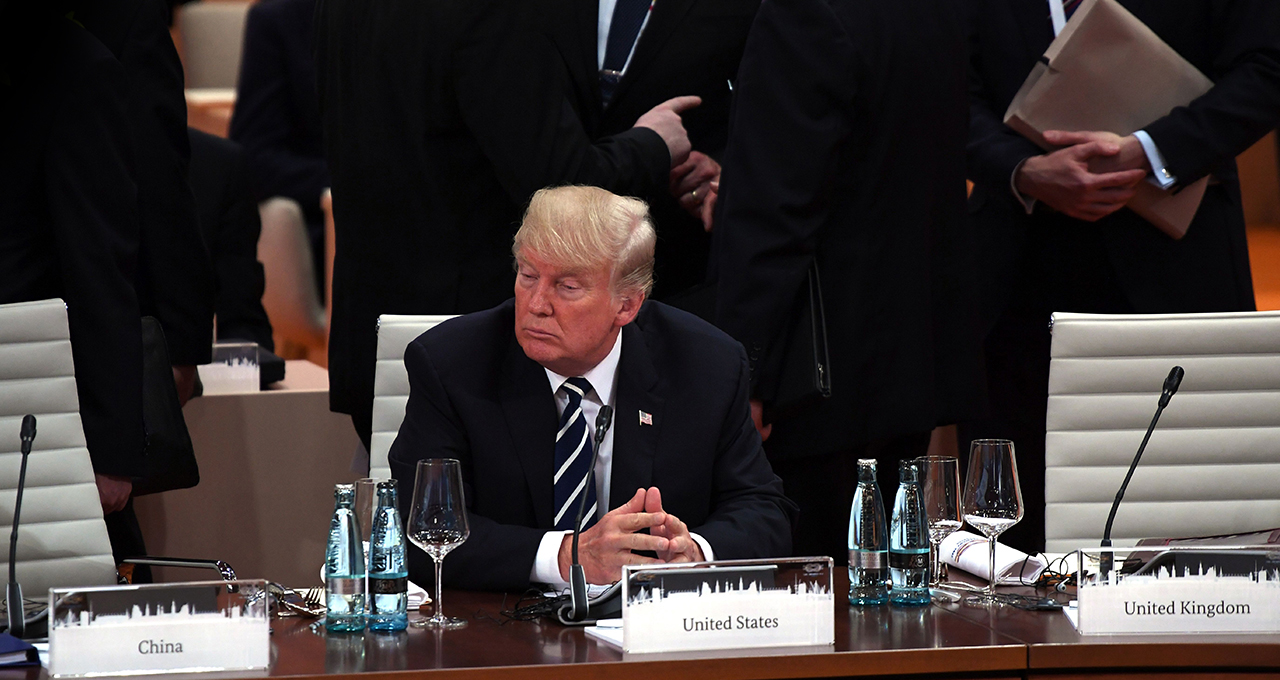
How we did this
This analysis focuses on understanding the international image of the United States and worldwide confidence in U.S. President Donald Trump and approval of his signature foreign policies. Pew Research Center has been tracking views of the U.S. and confidence in the U.S. president over the past 20 years. The report also includes trend comparisons of confidence in Trump to his predecessors (Barack Obama and George W. Bush) as well as other current world leaders (Angela Merkel, Emmanuel Macron, Vladimir Putin and Xi Jinping).
For this report, we used data from a survey conducted across 33 countries from May 18 to Oct. 2, 2019, totaling 36,923 respondents. The surveys were conducted face-to-face across Africa, Latin America, the Middle East and South Asia and on the phone in North America and the Asia-Pacific. Across Europe, the survey was conducted over the phone in France, Germany, the Netherlands, Spain, Sweden and the UK, but face-to-face in Central and Eastern Europe, Italy, Ukraine and Russia. U.S. data and analysis are excluded from this report.
Here are the questions used for the report, along with responses, and its methodology.
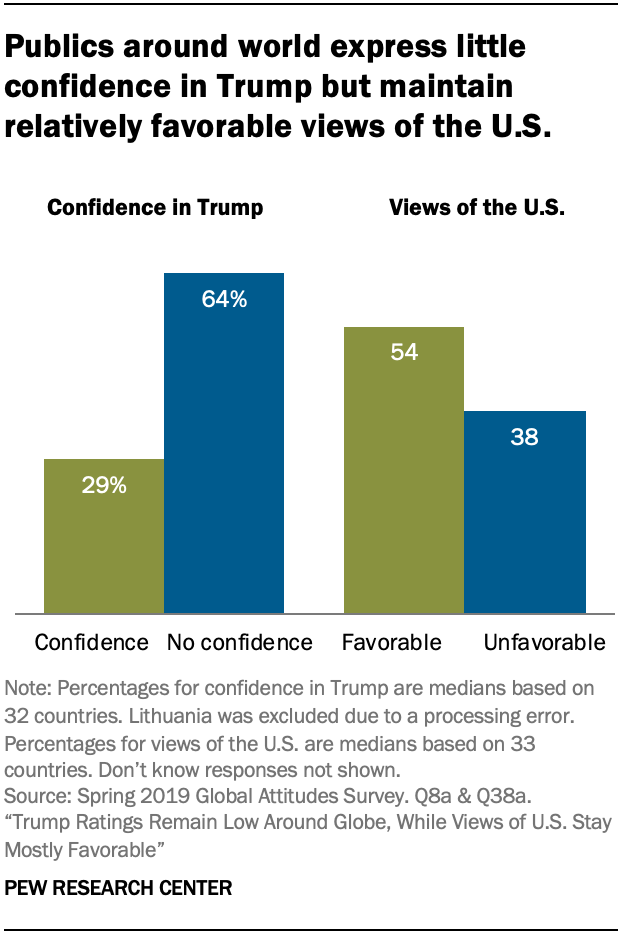
As has been the case throughout his presidency, U.S. President Donald Trump receives largely negative reviews from publics around the world. Across 32 countries surveyed by Pew Research Center, a median of 64% say they do not have confidence in Trump to do the right thing in world affairs, while just 29% express confidence in the American leader.
Anti-Trump sentiments are especially common in Western Europe: Roughly three-in-four or more lack confidence in Trump in Germany, Sweden, France, Spain and the Netherlands. He also gets especially poor reviews in Mexico, where 89% do not have confidence in him.
In nearly all nations where trends are available, Trump receives lower ratings than his predecessor, Barack Obama. As reported by the Center in 2017, international confidence in the U.S. president plummeted after Trump’s inauguration, while favorable ratings for the United States also declined.
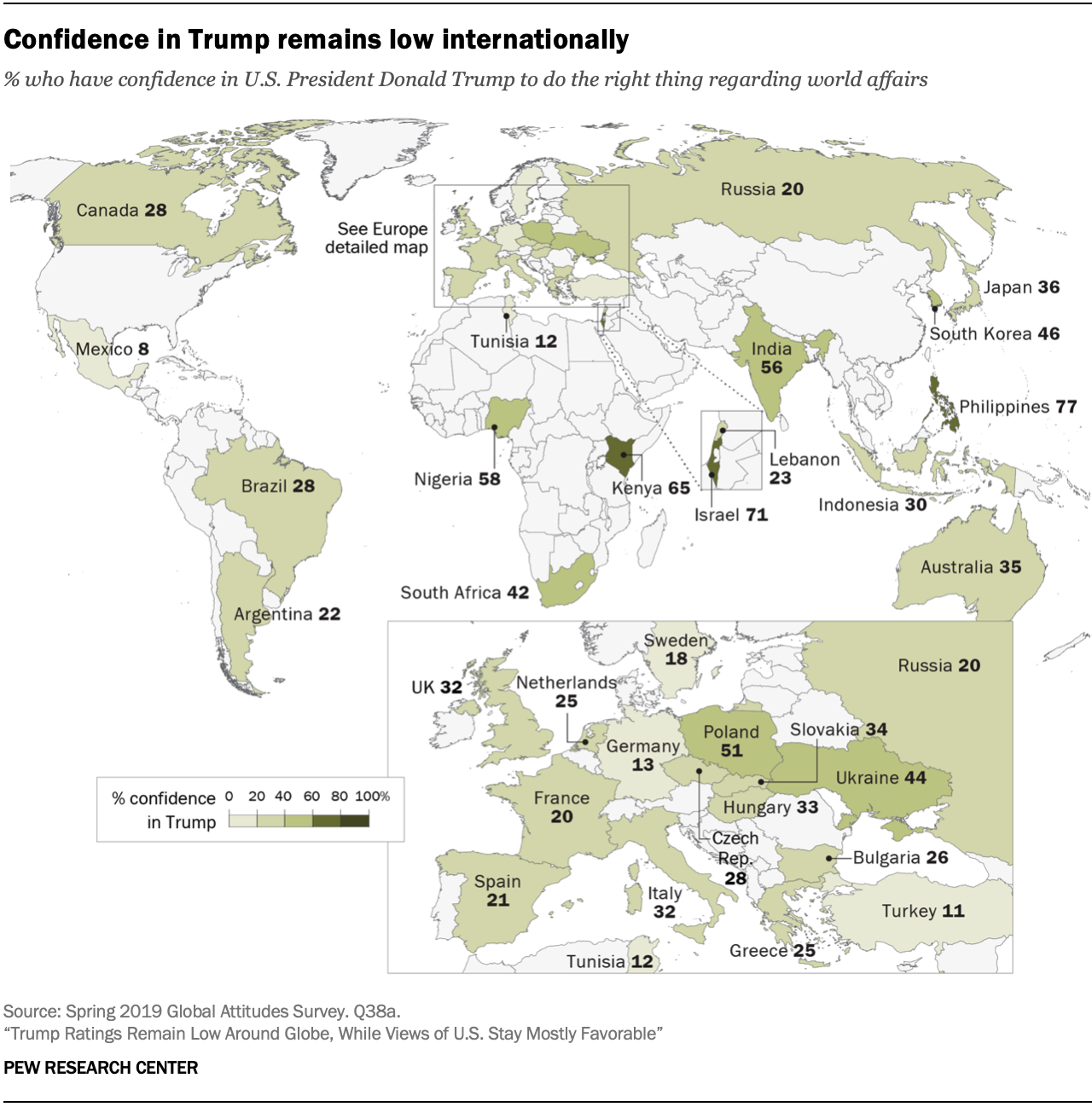
The current survey finds an uptick in some countries since 2018 in ratings for President Trump and the U.S., though the degree of change varies from modest to solidly positive. At least two plausible factors may be behind these shifts. First, support for Trump has increased somewhat on the ideological right in many nations. Second, some of the changes could be influenced by modifications in how the 2019 survey was administered (see sidebar below).
Pew Research Center has tracked global opinion of the United States since 2002. Over that period, we have seen substantial changes in attitudes toward the U.S., especially following the election of a new president. The first occurred when Barack Obama replaced George W. Bush: Favorability ratings of America in Europe and in many other countries soared. The opposite scenario occurred when Donald Trump assumed the duties of president: Favorable opinion of the U.S. plummeted in numerous countries, again particularly in Europe.
In years with no change of U.S. president, the Center has also observed shifts in foreign attitudes toward the U.S. and its leader. Sometimes these shifts are connected to U.S. policy or actions, as in the case of the Iraq War in 2003; sometimes they reflect domestic realities, such as the case of right-wing voters in Europe recently growing more favorable toward the U.S.
Sometimes administrative procedures may also influence how respondents answer questions. In accordance with the European Union’s new General Data Protection Regulation, the current survey’s introductory language placed increased emphasis on the fact that Pew Research Center is based in the U.S. and that survey results would be sent to the U.S. for analysis.
Highlighting the American sponsorship of the survey may have encouraged some respondents to answer more favorably when confronted with questions about the U.S. and its president or policies. We cannot say for certain how widespread or significant this effect may have been, but its plausibility leads us to exercise caution when stating the degree of change in European attitudes toward the U.S.
This past year also saw a change in the company that coordinates the survey, as well as many of the in-country polling firms responsible for fieldwork. While instructions to firms and interviewers were consistent with previous years, “house effects” associated with the new fieldwork force may have introduced a degree of “noise” into precise year-over-year comparisons between our 2018 and 2019 survey results.
Again, on balance, foreign publics lack confidence in Trump to do the right thing when it comes to world affairs. The survey, conducted in spring and summer 2019, finds that the lack of confidence in the 45th U.S. president is driven in part by opposition to his policies. A median of 68% across the nations polled say they disapprove of the U.S. increasing tariffs on imported goods; a median of 66% oppose the Trump administration’s withdrawal from international climate agreements; and 60% disapprove of Trump’s proposal to build a wall on the border with Mexico.
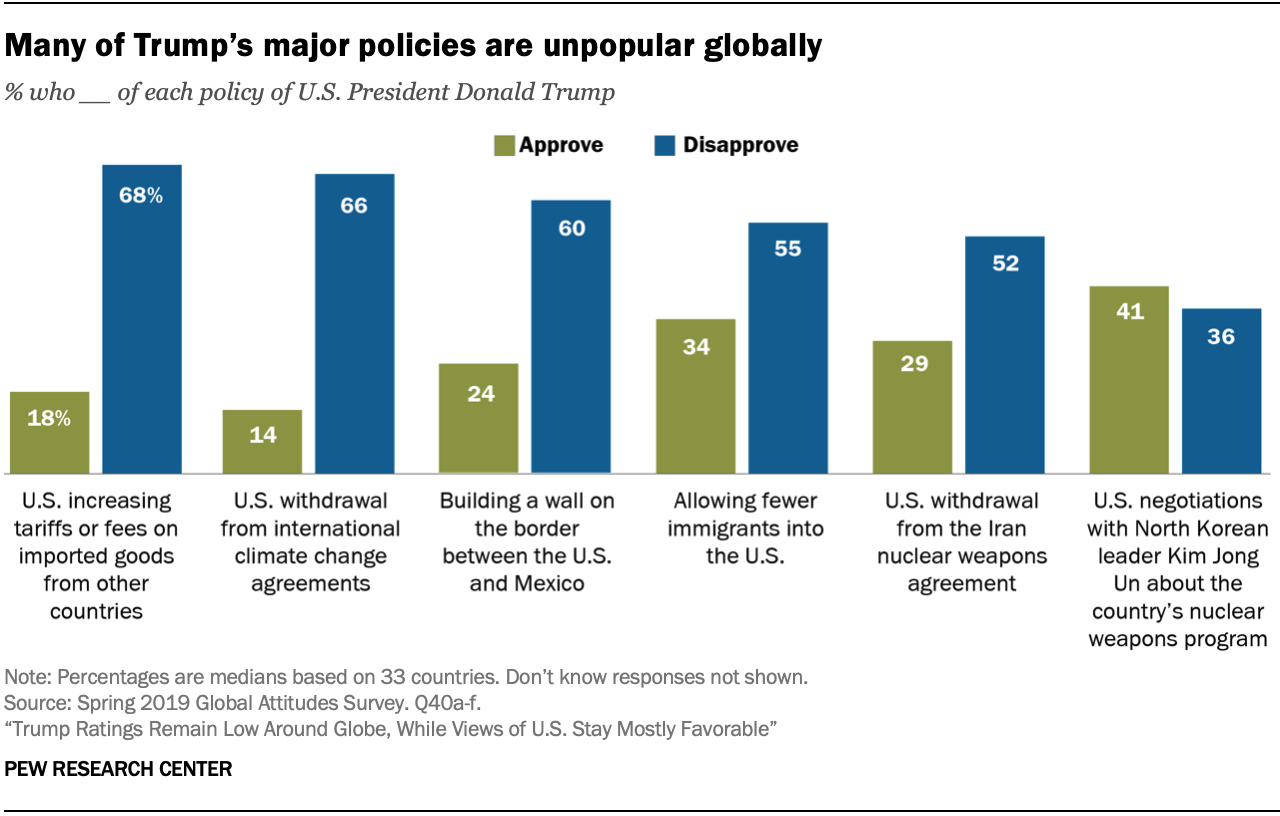
Most also dislike the current administration’s tighter restrictions on immigration and its withdrawal from the Iran nuclear weapons agreement.1
Trump’s approach to North Korea is the only policy position tested that is viewed favorably on balance, with a median of 41% saying they approve and 36% disapproving.
Still, Trump does find pockets of support. There are six nations where roughly half or more voice confidence in his handling of world affairs. About seven-in-ten have confidence in Trump in Israel, where 74% endorse his decision to move the U.S. Embassy from Tel Aviv to Jerusalem and 66% back his withdrawal from the Iran nuclear deal. In Ukraine, just under half (46%) rate the U.S. president positively.2
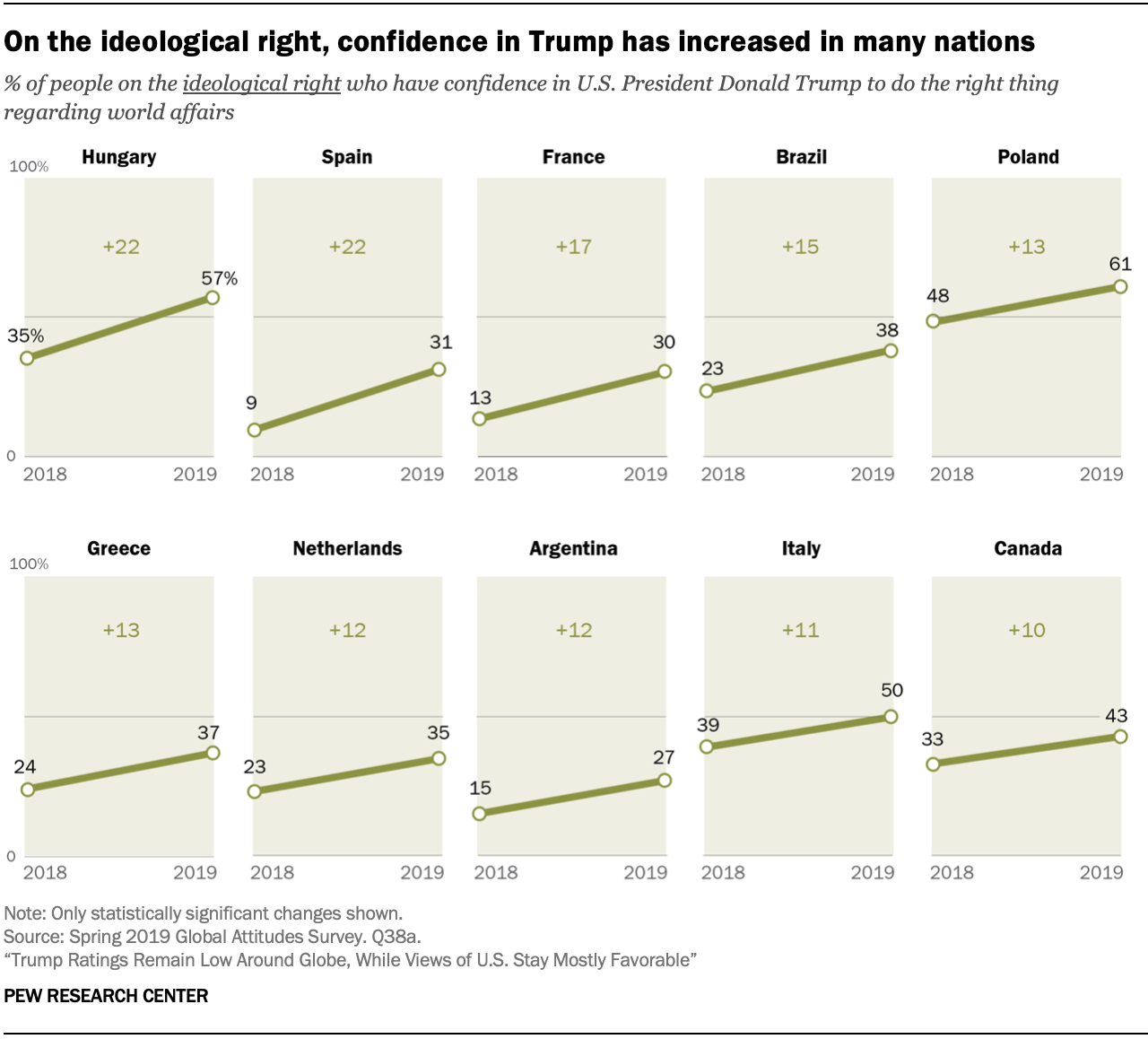
And Trump is generally more popular among people on the political right. In 18 nations, those who place themselves on the right side of the ideological spectrum express more confidence in the U.S. president. For example, more than eight-in-ten Israelis on the ideological right have confidence in Trump, compared with just 37% of those on the left. Only 14% of Australians from the left give Trump positive marks, compared with a 55% majority among people from the right. And a significant gap between right and left exists in 12 of the 14 European Union nations polled. Yet even among respondents on the right, confidence in Trump rises to 50% or higher in only six nations.
Positive ratings for Trump have increased significantly since 2018 among those on the right in several nations. Confidence in Trump from the right is up 15 percentage points or more in Hungary, Spain, France and Brazil, and it has increased by at least 10 points in an additional six nations.
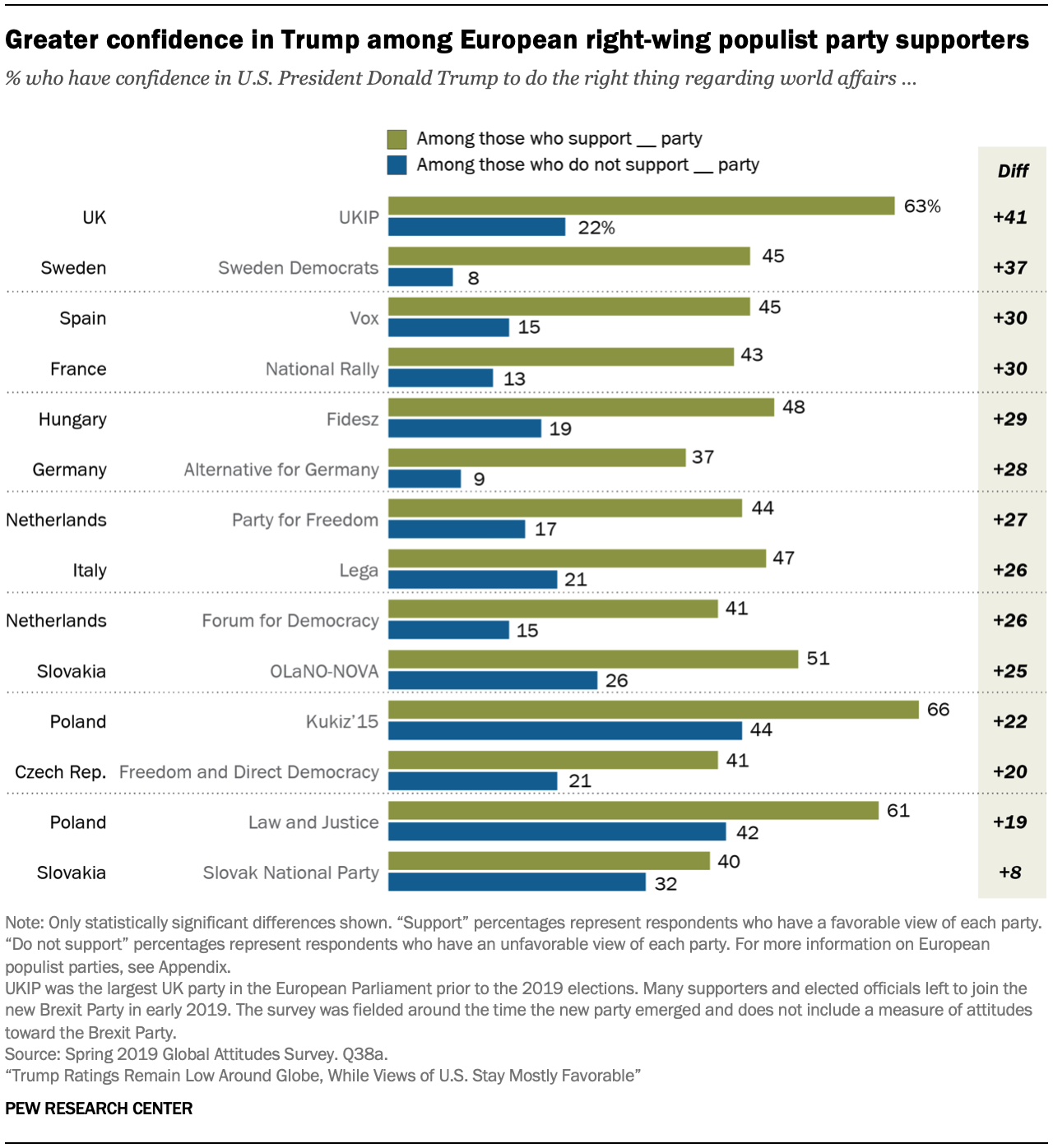
Trump gets somewhat higher marks among people who express positive views of right-wing populist European political parties. For example, in France, among those with a favorable opinion of Marine Le Pen’s National Rally (formerly National Front), 43% have confidence in Trump, compared with only 13% among people with an unfavorable view of National Rally.
Supporters of right-wing populist parties are also more likely to endorse Trump’s key policies. For instance, 67% of people who have a positive view of National Rally support Trump’s immigration policy, but just 22% say the same among those who dislike National Rally. There is a 40 percentage point gap on this question between supporters and nonsupporters of Alternative for Germany and the Sweden Democrats. Similar significant gaps between those who like and those who do not like right-wing populist parties exist in Poland, the Netherlands, UK, Italy, Spain, the Czech Republic and Hungary. Still, even among those with favorable views of these parties, support for Trump’s policies is limited.
The survey asked all respondents about four international leaders in addition to President Trump: German Chancellor Angela Merkel, French President Emmanuel Macron, Russian President Vladimir Putin and Chinese President Xi Jinping. Trump receives the highest negative ratings among the five leaders, though ratings for Putin and Xi are also on balance negative.
Across the 33 countries surveyed a median of 54% express a favorable opinion of the United States, while 38% have an unfavorable one. Favorable opinion of the U.S. declined dramatically when Trump took office and remains significantly lower than during the Obama era.
These are among the major findings from a Pew Research Center survey conducted among 36,923 people in 33 countries from May 18 to Oct. 2, 2019.
More negative ratings for Trump than for other world leaders
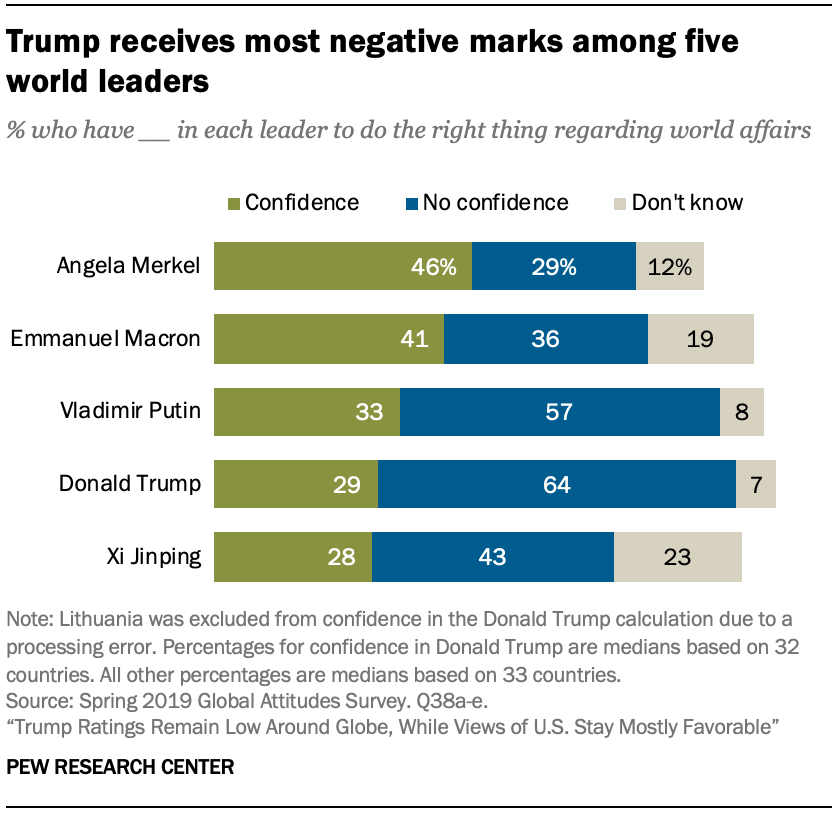
German Chancellor Angela Merkel receives the highest marks among the five leaders tested on the poll: A median of 46% express confidence in her leadership of world affairs, while 29% say they do not have confidence in the long-serving German leader. Views of Merkel vary widely within Europe. While roughly seven-in-ten or more have confidence in her in Sweden, the Netherlands, France, the UK, Germany and Spain, only 28% of Hungarians, 25% of Czechs and 22% of Greeks say the same.
By a slim margin, French President Macron receives more positive reviews (a median of 41% have confidence in him) than negative ones (a median of 36% lack confidence). Within Europe, the share of the public expressing confidence in the French leader ranges from 73% in Germany to 18% in Hungary.
Relatively few express confidence in Russian President Putin or Chinese President Xi. And U.S. President Trump receives more negative ratings than either the Russian or Chinese leader.
Ratings for U.S. mostly favorable, though low among some key allies
While overall attitudes toward the United States are favorable, there are large differences across the 33 nations in the study, especially among some of its key European Union allies. It receives its most positive reviews in the region from three Central and Eastern European nations: 79% of Poles, 70% of Lithuanians and 66% of Hungarians have a favorable opinion of the U.S.
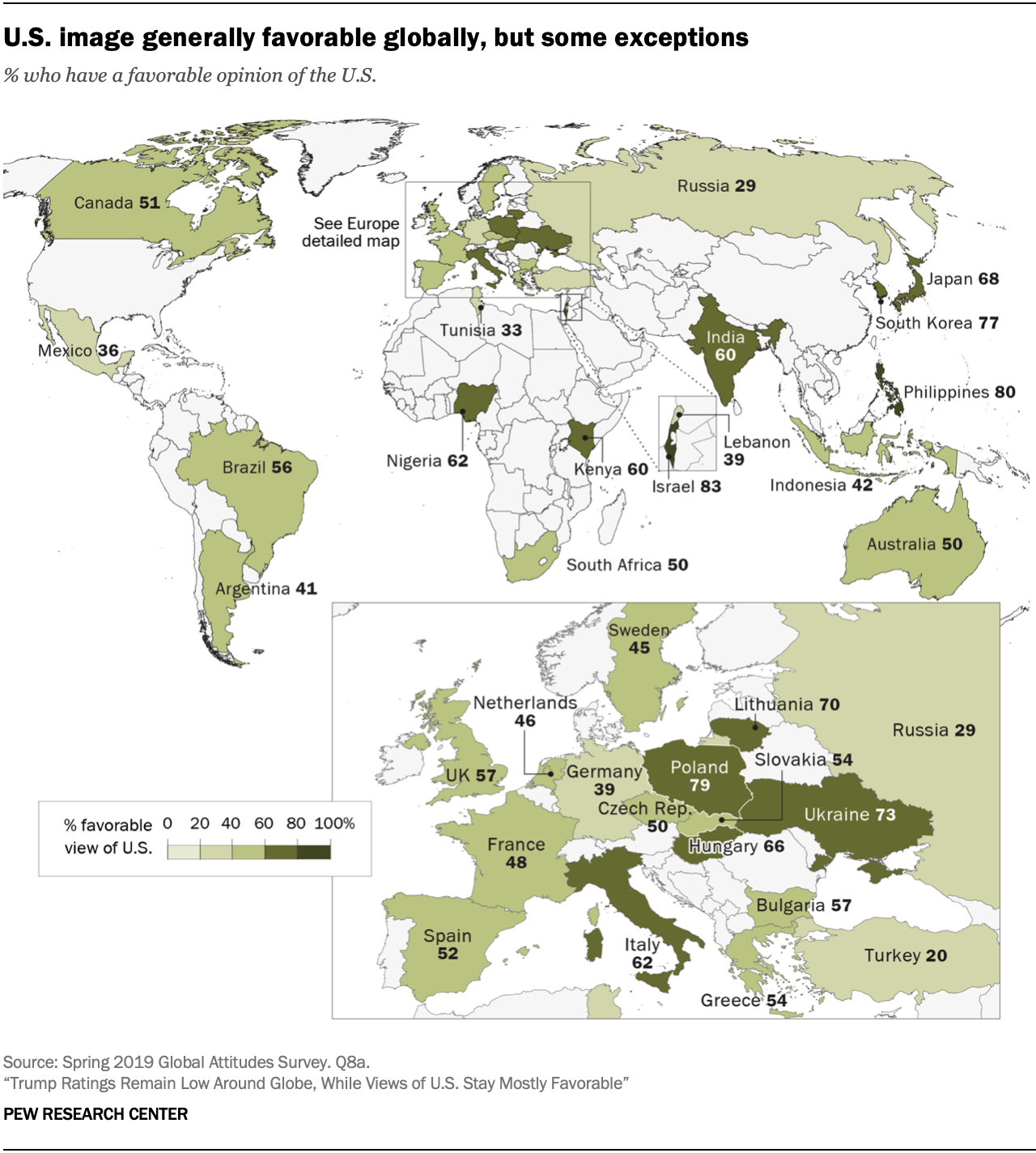
Meanwhile, Europe’s lowest ratings for the U.S. are in the Netherlands (46% favorable), Sweden (45%) and Germany (39%). Outside of the EU, ratings for the U.S. are much more positive in Ukraine (73% favorable) than in Russia (29%).
As has been the case over time in Pew Research Center surveys, most in the sub-Saharan African nations polled express favorable opinions of the U.S. Views in Asia are also mostly positive, though 45% in U.S. ally Australia currently give the U.S. an unfavorable rating.
Israelis give the U.S. its highest rating on the survey (83% favorable). But while 94% of Israeli Jews see the U.S. positively, just 37% of Israeli Arabs agree. Elsewhere in the Middle East and North Africa, attitudes are more negative. This is especially the case in Turkey, where just one-in-five have a favorable opinion of the U.S., the lowest percentage registered in the survey.
Views of the U.S. are mostly negative in Mexico, where just 36% give the U.S. a favorable rating, only 8% have confidence in Trump and fully 90% oppose the building of a wall on their country’s border with the U.S.
In many countries, there was no major change in U.S. favorability between 2018 and 2019, but 10 nations did see significant increases in the share of people with favorable views of the U.S. Most of these countries are in Europe. This nascent trend may be driven at least in part by increased favorability among supporters of right-wing populist groups in some nations, but it may also be related to changes in survey administration in the past year (see sidebar).
In five of the eight European countries where U.S. image has improved between 2018 and 2019 – France, Germany, Greece, Netherlands and Spain – there were significant increases in favorable views of the U.S. among people on the right of the ideological spectrum. For instance, 67% of Greeks who say they are on the right ideologically have a favorable opinion of the U.S., while just 40% held that view in 2018.




